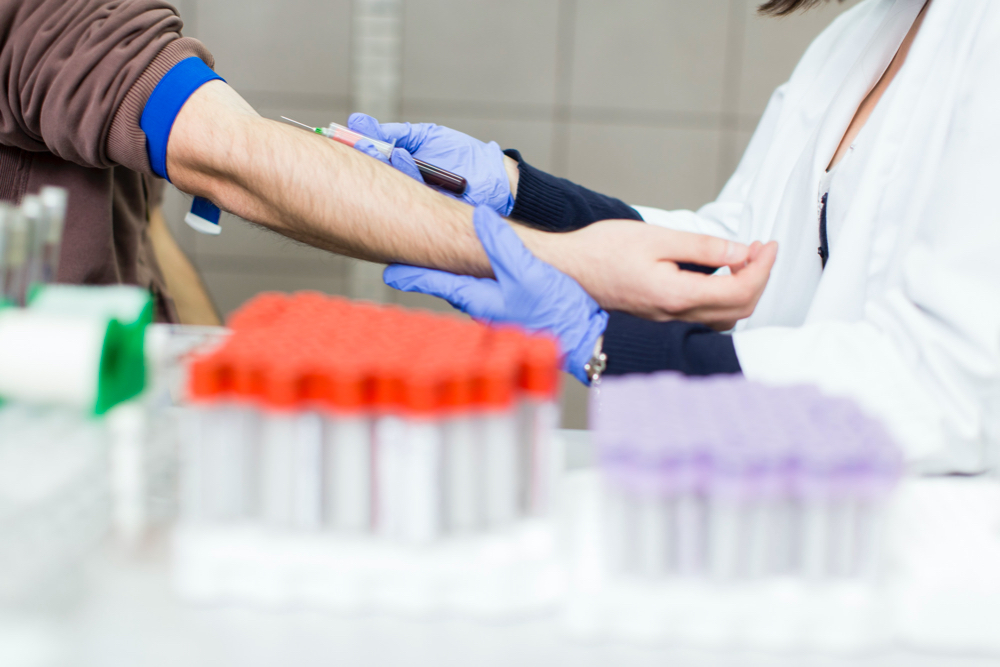- Fast results
- 4,000+ locations
- 4.8 star rating
Need Help? (888) GET LABS



Your healthcare provider can determine your recent smoking activity or tobacco exposure through a nicotine test. Nicotine is a chemical found in tobacco that stimulates the brain and makes you addicted to smoking. As a result, it is the primary biomarker for tobacco use tests or smoking tests.
You may need to take a nicotine test, including the assessment of its metabolites, to comply with your treatment plan or as part of your rehabilitation for nicotine addiction. To pass the test, you will have to refrain from smoking for a specific length of time.
Keep reading to learn more about the nicotine test, how long nicotine stays in the system, and effective ways to remove it.
Did You Know? Other than the nicotine test, there are other blood tests employers, insurance companies, courts, or other organizations require for procedural compliance. You can find them under drugs and alcohol tests.
A nicotine blood test screens for nicotine, an addictive stimulant found in tobacco products like traditional cigarettes, electronic cigarettes, and cigars. The test generally assesses tobacco usage within a specific timeframe or a detection window.
It also evaluates nicotine metabolites, particularly cotinine, produced when the body breaks down nicotine. In terms of longevity, cotinine stays in the body longer than nicotine, as it can still be detected even as long as ten days after your last smoke.
On the other hand, nicotine can last in the system for up to three days. Other nicotine metabolites include nornicotine, and trans-3’-hydroxycotinine, which are far less common in testing.
As smoking cessation programs require, smokers undergoing regular nicotine tests are prescribed additional lab evaluations to trace the possible source of nicotine, if there are any.
Anabasine and anatabine, alkaloids found in the tobacco plant, are screened to rule out that nicotine comes from tobacco use. Rather, its presence can be attributed to nicotine replacement therapy, which is common in the program.
You can take other nicotine tests that use urine, hair, and nails instead of blood samples for qualitative screening. However, a blood test does not only confirm the presence. It also measures the levels of nicotine in the system.
The nicotine blood test requires a blood sample drawn out from your veins. Since the procedure has to be done clinically, you must visit a medical laboratory and have a licensed phlebotomist do the blood testing.
Unlike other blood tests, you don’t need to prepare anything specific before the blood sampling. This means you don’t have to fast or limit any activity before undergoing a nicotine blood test.
In other tests involving urine or saliva samples, the requesting party would sometimes order random testing. But in the case of a blood test, not everyone may be inclined to readily get into the procedure, even with ample notice. If you’re uncomfortable with the whole blood collection process, learn our tips for getting blood drawn during lab tests.
You can take a nicotine test voluntarily to know for yourself the levels of nicotine in your system, especially if you’re a heavy smoker. Still, more often than not, the following institution and circumstances drive your decision to take a blood test for tobacco use, among others.
Nicotine and cotinine tests confirm the presence of these chemicals and provide accurate blood measurements to assess if the nicotine can be attributed to the use of tobacco products, nicotine-replacement therapy, or even secondhand smoke.
For example, if you are positive for nicotine and cotinine but the results show they’re less than 2 ng/mL, it’s highly possible that it’s due to your recent exposure to a smoker. However, if you have about 10 ng/mL of nicotine in your system, it may confirm your tobacco use within the detection window.

Nicotine can remain in your system for quite some time, as is, or in the form of metabolites, like cotinine. As a result, doctors can determine tobacco use or exposure within a certain time frame depending on the type of test you took.
Here’s a rundown of how long nicotine can be detected via lab workup based on samples.
While hair follicles and urine can retain nicotine and cotinine longer, you may want to take a blood test if you wish to know how much of these chemicals are in your system. On the other hand, a saliva nicotine test can be convenient for random testing.
If you’re unsure which test to go for, consult your doctor or the requesting party. You can also seek guidance from healthcare providers via a telehealth channel for fast and efficient medical consultation.
Eliminating nicotine from your body follows a natural course as other substances pass your system. But instead of just waiting for the chemical to get completely removed, you can take simple but proactive steps to speed up the process and fight off the unpleasantness of the withdrawal symptoms. Consider doing the following actions.
Most nicotine exits your body in the form of urine. Hence, it only makes sense to drink enough water when in the process of removing nicotine. In addition, water dilutes the chemical, and your urge to urinate increases.
While eight glasses of water a day is often the recommended standard, it may not be the case for you and your body type. To be certain, make sure to consult your doctor regarding how much water you should consume.
Additionally, drink green tea and natural juices, like cranberry, instead of soda and other beverages. This way, you can acquire antioxidants that help break down nicotine fast, resulting in faster removal.
Antioxidants are known to expel toxins from the body and combat oxidative stress, including nicotine. Instead of junk foods, opt for fruits and vegetables like berries (blueberries, raspberries, cranberries, etc.), artichokes, dark leafy greens, prunes, pecans, dark chocolate, and more.
Aside from urine, your body also expels nicotine via sweat. Thus, if you have an inactive lifestyle, it’s high time to start moving more. Aside from removing nicotine faster, you’re also getting distracted from withdrawal symptoms like irritability and anxiety.
You can visit the gym for a good workout, go to a nearby park and jog, get into sports, or start small by doing light exercises at home. Whichever you go for, just make sure you’re consistent to get maximum health benefits.
Since sweat channels nicotine out of your system, consider spending time in a sauna. The steamy atmosphere will push you to produce tons of sweat. Book a stay for about 20 to 30 minutes. If there’s no sauna near your place, spend time outside when it’s warm.
For many heavy smokers, removing nicotine is synonymous with quitting smoking. Unfortunately, when you start depriving your brain of a stimulant like nicotine, withdrawal symptoms can get so bad that you’ll be tempted to relapse. In this sense, the best way to stay on track is to secure help from your social group, family, or a rehabilitation center.
It’s not easy to repel nicotine addiction. But with ample support, proper planning, and unwavering determination, it’s not far from possible.
So if you’re planning to shake off your smoking habits or are in the process of doing so, know these critical mistakes you should avoid. On top of that, remember how avoiding the negative health effects of cigarette smoking, like cardiovascular diseases and lung cancer, is always better than continuing with the habit.
You can expect blood tests to detect nicotine acquired from smoking 1 to 3 days ago since nicotine stays in the system for up to 72 hours.
On the other hand, cotinine can still be detected even on the 10th day since you’ve smoked. Hence, even if you test negative for nicotine on day five (post-smoking), you’ll still get a positive result in your tobacco use test if the lab technician traces cotinine in your blood.
A quantitative nicotine test measures even the faintest amount of nicotine, even below 50 ng/mL. However, laboratories have different standards when it comes to nicotine levels that suggest recent tobacco use. Naturally, low nicotine levels may not be directly linked to smoking as it could result from secondhand exposure or the use of non-smoking nicotine products.
Aside from blood tests, nicotine and its metabolites, like cotinine, can be detected via urine, saliva, nails, and hair follicle tests designed to screen for the substance. Since the method of assessing nicotine levels in the body is specific, it’s unlikely that it should show up in tests that don’t target nicotine or cotinine.
You’ll be prone to relapses for the first couple weeks of quitting smoking and may experience the worst of withdrawal symptoms, depending on your genetic makeup. In addition, you can expect an increase in your heart rate and blood pressure. Plus, you may feel hungrier, grouchy, restless, and even anxious. It’s also likely for you to experience sleeping problems. Still, managing your urge to smoke is the biggest challenge you’ll have to deal with.
While you can tweak your daily routine a little to hasten nicotine detox, you still have to quit proactively – whether cigarette or vape – for at least two weeks to pass a nicotine test. Since nicotine and cotinine tests can be sensitive to even small amounts of the compound, it’s unlikely to get favorable test scores if you choose not to abstain from smoking before the test.
As nicotine and cotinine tests are not just confined to standard testing procedures for diagnostic and monitoring purposes, medical laboratories continuously improve to make them more sensitive and accurate. So whether you’re taking it to comply with your employment requirements or as part of your rehabilitation therapy, understanding how it works allows you to prepare correctly and get negative results.
Nicotine tests can be in the form of at-home kits or in-lab procedures. If you’re aiming for accurate and more reliable testing handled by professionals, getting tested for nicotine/cotinine in a trusted lab is always the best way to go.
Data Sources:
[1] Gormsen, J., Hjørne, F., & Helgstrand, F. (2019). Cotinine Test in Evaluating Smoking Cessation at the Day of Bariatric Surgery. Scandinavian Journal of Surgery. https://doi.org/10.1177/1457496919866017
[2] Kawasaki, Y., Li, S., Ootsuyama, Y., Nagata, K., Yamato, H., & Kawai, K. (2020). Effects of smoking cessation on biological monitoring markers in urine. Genes and Environment, 42. https://doi.org/10.1186/s41021-020-00165-z
[3] Marques, H., Cruz-Vicente, P., Rosado, T., Barroso, M., Passarinha, L. A., & Gallardo, E. (2021). Recent Developments in the Determination of Biomarkers of Tobacco Smoke Exposure in Biological Specimens: A Review. International Journal of Environmental Research and Public Health, 18(4). https://doi.org/10.3390/ijerph18041768


We now offer pharmacy discounts through our PersonalabsRx platform.
We now offer pharmacy discounts through our PersonalabsRx platform.